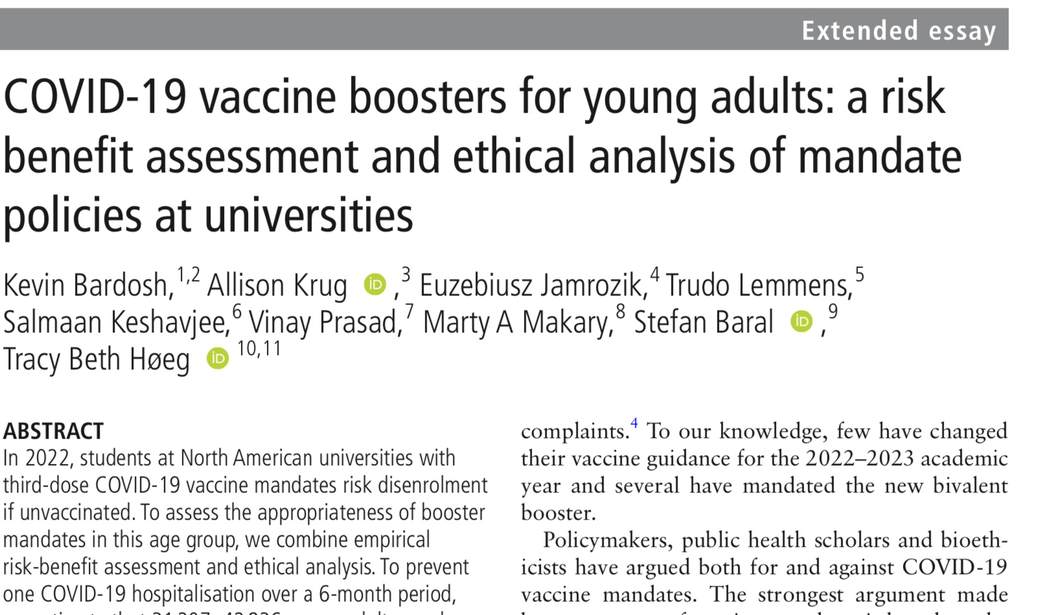A few months back you probably never would have heard of this study.
Why? Because Twitter and Facebook would have censored it for violating the CDC/Biden Administration Narrative.
Vinay Prasad is a medical doctor and epidemiologist I have been following since the pandemic began. He has been a voice of reason and moderation on COVID interventions, leaning towards the Swedish approach to dealing with COVID and highly critical of the CDC’s wildly gyrating advice and guidance. He is vaccinated himself and recommends the vaccine for most people. But he is a serious skeptic of mandates and many of the non-medical COVID interventions such as masking.
One of the problems with interfering with medical debate and speech on online platforms is the appetite for truth grows.
Altmetric 1300+ based on tweets alone in 7 hrs 👇
Massive https://t.co/ltZ4TgJqMh pic.twitter.com/7pm4hWNgfi
— Vinay Prasad MD MPH (@VPrasadMDMPH) December 6, 2022
His is one of a growing number of voices pushing back against the CDC’s ever greater deviations from scientifically sound policies. The CDC was always shooting from the hip, but as the pandemic has progressed their guidance has gotten worse, not better.
Prasad, along with a long list of colleagues has an extended essay in the BMJ’s Journal of Medical Ethics arguing that vaccine mandates for college age students will cause far more harm than the benefits, based upon data provided by the CDC and Pfizer. The results, which are based upon a statistical analysis of the data provided by the CDC, indicate that for each COVID-related hospitalization prevented in the 18-29 year-old group, there would be 18.5 serious adverse events caused by reactions to the vaccines.
Using CDC/Pfizer data,we estimate 31,207-42,836 previously UNINFECTED adults 18-29 yrs must be boosted to prevent 1 C19 hospitalization over 6 months.But we also estimate 18.5 serious adverse events
Displayed per million boosted:
32 hospitalizations prevented = 593.5 SAEs
4/13 pic.twitter.com/XOfJpIV7Ux
— Kevin Bardosh (@KevinBardosh) December 5, 2022
I am not going to do a deep dive into the analysis as I did earlier today with the German study on COVID vaccine induced deaths, because Kevin Bardosh’s Twitter thread lays out the conclusions in an easy to understand format.
The bottom line, though, is this: in a population where the risks of serious COVID induced complications is extremely low, it is a bad idea to force vaccinations on people. In fact, it may be a bad idea to provide vaccinations to this cohort unless there is an underlying health problem that warrants the risk. Diabetes, for instance, or heart disease. Do so violates the “do no harm” principle.
What Prasad et. al. are pointing out is what used to be obvious, but what the CDC in an effort to “simplify” their messaging has ignored: all medical procedures have risks and benefits, and a good practitioner and a wise patient will weigh both when deciding to do a medical procedure of any kind.
Vaccinations have always carried risks; even the most common and beneficial do. The COVID vaccine–especially the mRNA vaccines–were new and untested, and have proven to carry special risks for certain populations. The risks may not outweigh the benefits for many or even most people, but they clearly do in some.
By not making this clear–and worse, forcing the vaccine on those for whom the risks outweigh the benefits–the CDC and those forcing vaccine mandates on populations are doing real harm to people. And they certainly should know it, and in the case of the CDC certainly do know it. Universities can be (mostly) forgiven for trusting the CDC, but the CDC cannot be forgiven for violating that trust.
Dr. Martin Makary explained why the CDC chose to go down this path in this article I referred to in my earlier post:
Dr Jha says its "crystal clear" that a healthy young male needs a bivalent (4th) Covid vax dose but..
he can't tell you how many *healthy* children have ever died of Covid &we have no biv trial data. How can he know the risk:benefit calc without the data? https://t.co/8dKZmMIlvS
— Marty Makary MD, MPH (@MartyMakary) December 3, 2022
It boils down to this.
People don’t trust the CDC. Here’s one example illustrating why. Two weeks ago, with no outcomes data on COVID-19 booster shots for 5-to-11-year-olds, the Centers for Disease Control (CDC) vigorously recommended the booster for all 24 million American children in that age group. The CDC cited a small Pfizer study of 140 children that showed boosters elevated their antibody levels—an outcome known to be transitory.
When that study concluded, a Pfizer spokesperson said it did not determine the efficacy of the booster in the 5-to-11-year-olds. But that didn’t matter to the CDC. Seemingly hoping for a different answer, the agency put the matter before its own kangaroo court of curated experts, the Advisory Committee on Immunization Practices (ACIP).
I listened to the meeting, and couldn’t believe what I heard. At times, the committee members sounded like a group of marketing executives. Dr. Beth Bell of the University of Washington said “what we really need to do is to be as consistent and clear and simple as possible,” pointing out that the committee needed “a consistent recommendation which is simple.”
The fear that drives the CDC is that people are incapable of informed consent, and that therefore we should just avoid the entire “informed” and “consent” parts of the equation. Any complication of the message could confuse people and make them skeptical, so best to just make blanket statements that elide the truth to get people to conform.
The idea can be summarized: “sure, it makes no sense to vaccinate young people, but if we say that people might think the vaccine is dangerous. So jab ’em all.”
Other committee members similarly emphasized the importance of a universal booster message that applies to all age groups. Dr. David Kimberlin, editor of the American Academy of Pediatrics Red Book, speaking on his own behalf, said “Americans are yearning for, are crying out for a simpler way for looking at this pandemic.” He suggested that not recommending boosters for young children would create confusion that “could also bleed over to 12-to-17-year-olds, and even the adult population.”
The committee also debated how hard to push the booster recommendation, discussing whether the CDC should say that 5-to-11-year-olds “may” get a booster versus “should” get it.
Exhibiting classic medical paternalism, committee member Dr. Oliver Brooks of the Watts Healthcare Corporation said “I think may is confusing and may sow doubt,” adding “if we say should more people will get boosted versus may, then we may have more data that helps us really define where we’re going.” Dr. Brooks was essentially suggesting that boosting in this age group would be a clinical trial conducted without informed consent.








Join the conversation as a VIP Member